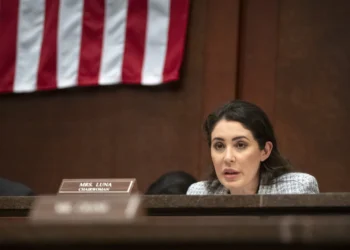Americans have watched with horror as more than 100 people — and counting — have been found dead following horrific flooding in Texas. Twenty-seven little girls and counselors at Texas’s Camp Mystic were killed — a heartbreaking tragedy that takes the breath away.
Why did God allow this to happen? If God is truly all loving and all powerful, why did He not step in and prevent this tragedy? Is God even good at all? Does He even care?
After his beloved wife Joy Davidman died, C.S. Lewis wrestled with these questions. Journaling his thoughts and emotions, he wrote in A Grief Observed, “Not that I am (I think) in much danger of ceasing to believe in God. The real danger is of coming to believe such dreadful things about Him.”
The Federalist’s Senior Editor John Daniel Davidson, with refreshing honesty, responded to the difficult questions posed above in an enlightening piece. He pointed out that Christians “are called upon to explain how the existence of an omnipotent, omniscient God is consistent with a world beset by death and suffering.”
Indeed, we are. The problem of evil and suffering is the most significant evidence against God’s existence — and Christians cannot shrink back nor shy away from the problem. To do so would be to sell our faith short.
Davidson, however, takes issue with the idea that evil and death might “have some positive role to play in Divine Providence.” It’s true, he concedes (and I agree) that “evil and death are … corruptions of reality that God, in His omnipotence, can redeem and use for His own good purposes.” But to allow for any positive role for evil is “not the orthodox Christian view,” Davidson asserts.
To put it simply, I think this needs correcting.
The Mind of God
Davidson’s assertion that Christians “are not permitted” to believe that God might have allowed the devastation in Texas to “happen for some inscrutable or mysterious reason,” respectfully, goes too far.
As very limited, finite human beings, we are simply not in a good epistemic position to assess whether God has morally sufficient reasons for permitting certain instances of evil to occur. As philosophers J.P. Moreland and William Lane Craig write in Philosophical Foundation for a Christian Worldview, “We have no idea of the natural and moral evils that might be involved in order for God to arrange the circumstance and free agents in them requisite to some intended purpose, nor can we discern what reasons such a provident God might have in mind for permitting some evil to enter our lives.”
“Certainly,” they add, “many evils seem pointless and unnecessary to us — but we are simply not in a position to judge.” Only God — who sees the beginning and end of history and knows all things — can determine these things.
Now, this is not to argue that we know for certain God does have morally sufficient reasons for permitting horrific instances of evil. Much less does it mean we can know what those reasons are. Nor does this argument make evil good in and of itself. Evil is a privation of good; it is something that has gone wrong and is not as it should be. And it has real consequences. But Christians are, in fact, allowed to believe that God might have a justifying reason for permitting evil to occur.
O Felix Culpa
Now, Davidson does argue that God can and does “redeem and use [evil] for His own good purposes.” With this, I heartily agree. For Christians, perhaps one of the most comforting verses in all of Scripture is Romans 8:28: “And we know that for those who love God all things work together for good, for those who are called according to his purpose.”
Every Easter vigil, liturgical Christians around the world hear “The Exsultet” — an ancient Christian hymn — proclaimed. The hymn declares the wonderful gift of God, who sent his Son to die for and save us:
O wonder of your humble care for us!
O love, O charity beyond all telling,
To ransom a slave you gave away your Son!
O truly necessary sin of Adam,
Destroyed completely by the Death of Christ!
O happy fault
That earned so great, so glorious a Redeemer!
Indeed, the sin of Adam is a “felix culpa” (a “happy fault”) because, through it, God — in His benevolent care for us — caused an even greater good to come from it: the incarnation, the sacrifice of Christ on the cross, His resurrection, our salvation, and the redemption of the world.
Christian philosopher Alvin Plantinga writes in his felix culpa theodicy, “Perhaps God sees that the best worlds he can actualize are ones that include the unthinkably great good of divine incarnation and atonement. Suppose he therefore actualizes a … world that includes incarnation and atonement, and in which human beings fall into sin, evil and consequent suffering.”
In his encyclical Salvifici Doloris, Pope John Paul II reflected upon the possibility of redemptive suffering. That is, the possibility that God can — and does — redeem our suffering for good. “One can say that with the Passion of Christ all human suffering has found itself in a new situation,” he writes. “In the Cross of Christ not only is the Redemption accomplished through suffering, but also human suffering itself has been redeemed.”
In other words, through Christ — and because of Christ’s sacrifice — our very suffering can also be redeemed and provided with new purpose and meaning. Moreland and Craig make a similar point, writing, “the chief purpose of life is not happiness, but the knowledge of God.”
“Many evils occur in life that may be utterly pointless with respect to the goal of producing human happiness,” they observe, “but they may not be pointless with respect to producing a deeper knowledge of God.”
A Christian response to the problem of evil acknowledges it is possible that God permits evil and suffering because He can bring about a greater good from it.
The Person of Christ
Only Christianity addresses the problem of evil with an entirely unique answer among the world’s religions: God Himself — in the person of Christ — came to suffer with us, for us, and because of us.
Reflecting upon this fact, Christian philosopher Marilyn Adams writes, “[God] is not content to be immutable and impassible, to watch his writhing creation with the eye of cool reason. He unites himself to a human consciousness and takes the suffering to himself.” Only in Christianity does God enter His creation, live among His creatures, and ultimately bleed and die on behalf of and at the hands of His creation. Because He loves His creation. Because He loves us.
That, indeed, is a God we can trust in. In Christ, God truly is Immanuel. He is God with us — especially in our suffering and pain.
Christians know that, because of Christ, who takes on our suffering, one day, “death shall be no more, neither shall there be mourning, nor crying, nor pain anymore, for the former things have passed away” (Revelation 21:4).
Zachary Mettler works as a staff writer and communications liaison for the Daily Citizen at Focus on the Family. In his role, he writes about current political issues, U.S. history, political philosophy, and culture. Mettler earned his bachelor’s degree from William Jessup University and is an alumnus of the Young Leaders Program at The Heritage Foundation. In addition to the Daily Citizen, his written pieces have appeared in the Daily Wire, the Washington Times, the Washington Examiner, Newsweek, Townhall, the Daily Signal, the Christian Post, Charisma News, and other outlets.















